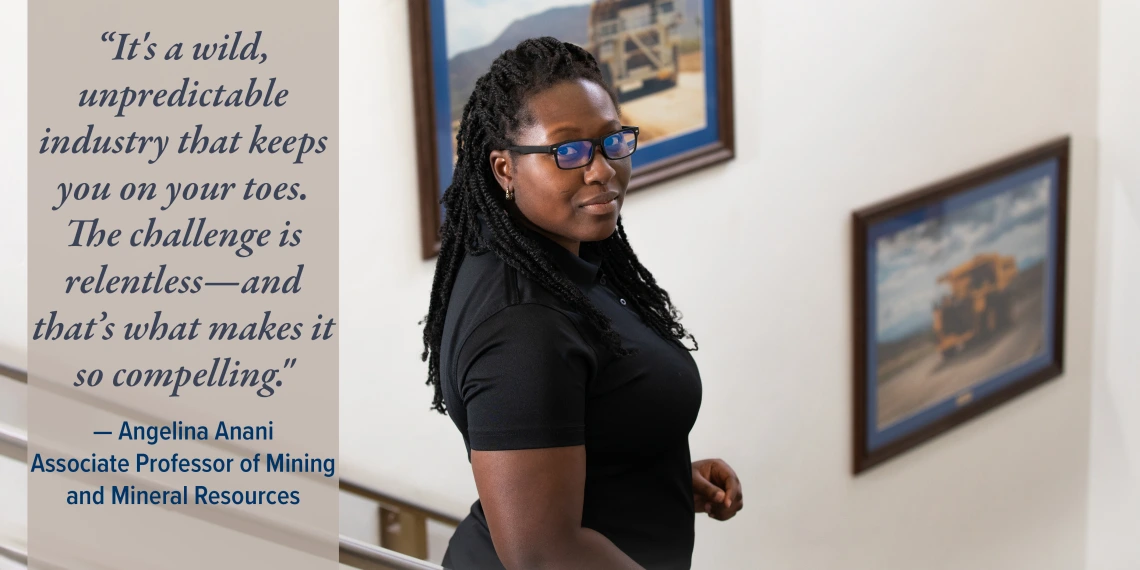Mining Is All Our Business, says U of A Mining Prof

Photo: Angelina Anani, associate professor of mining and mineral resources, in the Mines and Metallurgy Building. by Leslie Hawthorne Klingler
— Tucson, AZ —
We're all part of the same human story when it comes to mining. It's a message Angelina Anani, associate professor of mining and mineral resources, comes around to no matter her audience. Most people don't connect mining and their daily needs, she says. But their "medicines and makeup, food and phones" require minerals extracted from the ground. "When you say water is life, people know you die if you don't drink water. You know how it feels to be thirsty, but do you know how it would feel without mining in your life?"
"When you say water is life, people know you die if you don't drink water. You know how it feels to be thirsty, but do you know how it would feel without mining in your life?"
Add in the felt need to secure our mineral supply chain and reduce reliance on countries hostile toward the U.S., "and we've got ourselves a great argument for investing in mining," Anani says.
While Anani believes that figuring out how to mine for the long term is a shared societal challenge, it's logical, she says, for local populations to question whether the government and mining companies are doing things in their best interest. "The damage done by legacy mining can't be hidden like historical actions in other sectors," she says. The solution to building social license, she says, is to be as transparent as possible.
Anani identifies the first step in responsible mining: "Inspire all stakeholders to participate in conversations that are honest all-around." Work toward mining projects that are win-win, including for the planet. "You can't separate stakeholders," she repeats.
Advances in the field make win-win possible, says Anani. She mentions several: autonomous vehicles and equipment, real-time data analytics, advanced ore sorting, and electromagnetic surface imaging. The university, she says, is critical to helping the government develop these best technologies and practices.
Anani focuses her research on developing tools for decision support in mine planning and mining system optimization, machine learning and digital twin applications. "If your mine wants to switch from diesel to electric, how will that affect production or emissions? I can help companies make that decision."
She is working with a fourth-year PhD student to develop a digital twin system for San Xavier Mine. "We installed sensor technology, created a virtual representation of the mine, and collected data on the rock deformation remotely and in real-time." The project is about ready to showcase to mining companies.
Anani returns to her message that mining must be recognized as a universal human interest. She is glad to see the U of A is acting accordingly to build up the mining workforce. "We want to recruit engineers, and we need to inspire other disciplines to join the fold, including social and behavioral scientists. We engineers are not always built in a way to deal effectively with people! And regardless of who is in office, mining doesn't work well if the community is unhappy."
Why a career in mining?
Angelina Anani grew up in Botswana, in southern Africa. When one of the nation's universities launched a mining degree program— two years in-country followed by two years in the U.S. — "it sounded pretty cool to me," she said. "I didn't know anything about mining, but I was curious." When she discovered mining,
"I fell in love with mining because it’s a world of constant discovery and challenge. You're trying to extract value from the earth, and the earth doesn’t give it up easily. In the beginning, you don’t really know what lies beneath—but then you bring in science, engineering, and teamwork. It becomes a coordinated effort to meet human needs while minimizing the impact, striving for a balance between progress and preservation. It's a wild, unpredictable industry that keeps you on your toes. The challenge is relentless—and that’s what makes it so compelling."

